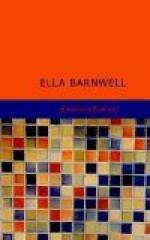“I have never heard the proposition advanced by another,” continued Algernon, after another slight pause, “but I have sometimes thought myself, that the soul departs from the body, for a brief season, and wanders at will among scenes either near or remote, and returns with its impressions, either clouded or clear, to communicate them to the corporeal or not, as the case may be: hence dreams or visions, and strong impressions when we wake, that something bright and good has refreshed our sleep, or something dark and evil has made it troubled and feverish. Again I have sometimes thought that this soul—this invisible and immortal something within us—has power at times to look into the future, and see events about to transpire; which events being sometimes of a dark and terrible nature, leave upon it like impressions; and hence gloomy and melancholy forebodings. This may be all sophistry—as much of our better reasoning on things we know nothing about often is—but if it be true, then may I trust to account for my present sadness.”
“Have you really, then, sad forebodings?” inquired Ella, quickly and earnestly.
“Against my will and sober reason, dear Ella, I must own I have. Perchance, however, the feeling was only called up by a train of melancholy meditations. While sitting there to-night, gazing upon the many bounding forms—some full of beauty and grace, and some of strength—noting their joyous faces, and listening occasionally to the lightsome jest, and merry, ringing laugh—I could not avoid contrasting with the present the time when I was as happy and full full of mirth as they. I pictured to myself how they would stare and shudder and draw away from me, did they know my hand was stained with the blood of my own kin. Then I began, involuntarily as it were, to picture to myself the fate of each; and they came up before me in the form of a vision, (though if such, it was a waking one) but in regular order; and I saw them pass on one after another—some gliding smoothly down the stream of time to old age—some wretched and crippled, groping their way along over barren wastes, without water or food, though nearly dying for the want of both—some wading through streams of blood, with fierce and angry looks—and some with pale faces, red eyes, and hollow cheeks, roving amid coffins, sepulchres and bones; but of all, the very fewest number happy.”
“Oh! it was an awful vision!” exclaimed Ella, with a shudder.
“It was awful enough,” rejoined Algernon; “and despite of me, it made me more and more sad as I thought upon it. Could it indeed be a dream? But no! I was—seemingly at least—as wide awake and conscious as at the present moment. I saw the dance going on as ever—I saw the merry smiles, and heard the jest and laugh as before. Could it be some strange hallucination of the brain—some wild imagining—caused by my previous exercise and over heat? I pondered upon it long and seriously,




